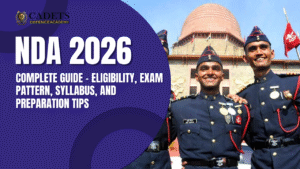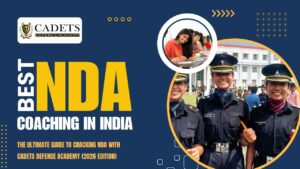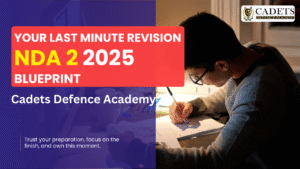
NDA Exam 2026 Eligibility, Age Limit, Exam date and Educational Qualification
Important Topics You Need To Prepare for AFCAT Exam Table of Contents NDA Exam 2026 Eligibility, Age Limit, Exam date and Educational Qualification Welcome, future officers! The National Defence Academy (NDA) exam isn’t just a test; it’s the most prestigious gateway for young aspirants to begin a life of honour, service, and leadership in the Indian Armed Forces (Army, Navy, and Air Force). Conducted twice a year by the Union Public Service Commission (UPSC), the NDA entry is a dream shared by countless young men and women across the nation. At Cadets Defence Academy Dehradun, we understand that your journey to wearing the uniform begins with clarity on the eligibility and the timeline. Getting these fundamental details right is the crucial first step in your preparation strategy. This comprehensive guide will not only lay out the official NDA Exam 2026 Eligibility Criteria, Age Limit, and Educational Qualification but will also equip you with the deep, insider knowledge—especially regarding the rigorous physical standards and the SSB Interview—that our successful cadets master. Let’s cut through the confusion and set the stage for your success in the NDA Exam 2026. Section I: NDA Exam 2026: A Quick Overview and Key Dates The NDA selection process is a three-stage marathon: the Written Examination, the SSB Interview (including the Psychological and Group Testing), and the Medical Examination. The final merit list is based on your performance in the written exam and the SSB interview. NDA 2026 Overview: Everything You Need to Know at a Glance Feature Detail Name of Exam National Defence Academy and Naval Academy Examination (NDA & NA) Conducting Authority UPSC (Union Public Service Commission) Exam Frequency Twice a Year (NDA I and NDA II) Exam Mode Pen & Paper Based Mode (Offline) Tentative Vacancies Approximately 400 (Subject to Official Notification) Level of Exam National Level Mode of Application Online only (Through the official UPSC website) Application Fee ₹100/- (Exemptions for SC/ST, Female Candidates, and Wards of JCOs/NCOs/ORs) NDA Exam Date 2026: The Critical Timeline The UPSC follows a strict, predictable schedule. We urge every aspirant to mark these official NDA exam dates 2026 and use them as non-negotiable deadlines in your study plan. For NDA 1 2026: Your First Shot at Glory Event Date (Confirmed/Tentative) NDA Notification Date 2026 (Release) 10th December 2025 Release of Application Form 10th December 2025 Ending Date of Application Form 30th December 2025 Application Correction (OTR details) 2nd week of January 2026 Admit Card Available 4th week of March 2026 NDA 1 2026 Exam Date 12th April 2026 (Sunday) Result Announcement 1st week of May 2026 SSB Interview May/June 2026 For NDA 2 2026: The Second Opportunity Event Date (Confirmed/Tentative) NDA Notification Date 2026 (Release) 20th May 2026 Release of Application Form 20th May 2026 Last Date to Submit the Application Form 9th June 2026 Application Correction 2nd week of June 2026 Admit Card Available 4th week of August 2026 NDA 2 2026 Exam Date 13th September 2026 (Sunday) Result Announcement September 2026 SSB Interview October 2026 NDA Exam Timeline 2026 Strategy: Start your preparation the day the notification is released, or even better, six months before the first notification. The window for application is short—do not wait for the deadline. Section II: Deciphering the NDA 2026 Eligibility Criteria The Basic Eligibility for NDA Exam 2026 is non-negotiable. Aspirants must strictly adhere to the UPSC-mandated requirements covering nationality, age, and marital status. Who Can Apply for NDA 2026? Nationality and Status Indian Nationals are eligible to apply. A subject of Nepal or a subject of Bhutan is also eligible. A person of Indian origin who has migrated from Burma, Pakistan, Sri Lanka, East African countries (Kenya, Uganda, Tanzania, Zambia, Malawi, Zaire, and Ethiopia), or Vietnam, with the intention of permanently settling in India. (A Certificate of Eligibility issued by the Government of India is mandatory in such cases). Gender, Marital Status, and Essential NDA Eligibility Requirements 2026 Gender: Both Male & Female candidates can apply for NDA & NA. This revolutionary inclusion has opened up the Armed Forces to the brightest young women in the country. Marital Status: Only unmarried candidates are eligible to apply. This status must be maintained until the completion of the training period. NDA Age Limit 2026: The Most Critical Factor The NDA age limit 2026 is the single most restrictive and important factor. UPSC is very rigid about the cut-off dates. Your Date of Birth (DOB) must fall within the specified period. There is no age relaxation in NDA 2026 for any category (SC/ST/OBC), unlike many other government exams. Age Criteria for NDA 1 2026 NDA 1 2026 Age Criteria for Boys & Girls Minimum Age for NDA 2026 Maximum Age Limit NDA Exam 2026 Date of Birth must fall on or between 2nd July 2007 1st July 2010 Age Criteria for NDA 2 2026 NDA 2 2026 Age Criteria for Boys & Girls Minimum Age for NDA 2026 Maximum Age Limit NDA Exam 2026 Date of Birth must fall on or between 2nd January 2008 1st January 2011 IMPORTANT: This is the precise Age Eligibility for NDA Entry 2026. If your birth date is even one day outside this range, you are ineligible. Use our Cadets Defence Academy Age Calculator tool on our website for an instant, accurate check! Section III: Educational Qualification: Your Academic Passport to the Forces The NDA Educational Qualification 2026 is determined by the specific wing you wish to join. Aspirants need to pay close attention to the required subjects. Educational Requirements NDA Exam 2026 for Each Wing Wing/Academy Minimum Education for NDA 2026 Stream-Wise Eligibility NDA 2026 Army Wing of NDA Must have passed the 10+2 (or equivalent) examination from any recognized Board. Any Stream (Arts, Commerce, Science) is accepted. Air Force & Naval Wings of NDA Must have passed the 10+2 (or equivalent) examination from a recognized State or National Board. Mandatory Subjects: Physics, Chemistry, and Mathematics (PCM). Naval Academy (10+2 Cadet Entry Scheme) Must have passed the 10+2 examination. Mandatory Subjects: Physics, Chemistry,









